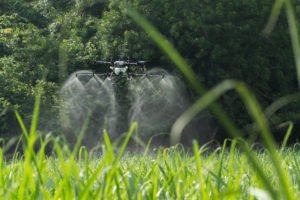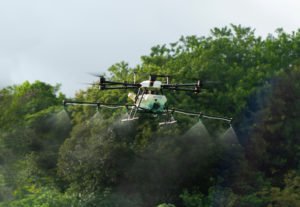
By Jim Magill
Mark Twain once said, “Buy land; they’re not making it anymore.” If he were alive today, he probably would have added that buyers of agricultural land should also look into using drone technology in order to improve the value of their investment.
Arthur Erickson, CEO and co-founder of Hylio, an agricultural drone maker, predicted that there would be a boom in the agriculture technology space in the next several years, as farmers take advantage of advances in drone, robotic and software technology to improve crop yields and reduce their use of pesticides harmful to the environment.
“I urge people to look into the ag tech space as an investment sector,” he said. “We’re into some really cool things, but, it’s not just us. There are other great ag companies.”
Founded in 2015, the Richmond, Texas-based company has quickly grown to become a successful U.S.-based manufacturer of agriculture-related drones and software.
“There are no other US companies that are commercially producing these spray drones on the scale that we are. There are a few other shops here in the U.S., research institutions, like MIT, that are experimenting with spray-drone technology, but they’re not selling it like we are,” he said.
According to a recent report by Fortune Business Insights, the global agriculture drone market size was $1.02 billion in 2019 and is projected to reach around $3.70 billion by 2027. The report found that in 2019, large international drone manufacturers, including Drone Deploy, DJI, GoPro, Precision Hawk and AeroVironment dominated the global market for agricultural drones.
But the report also predicted that the lack of barriers to entry would lead to an increasing number of newer U.S.-based players to enter the global market. While about 80% of its business comes from the domestic U.S market, Hylio also does a substantial portion of its business in Latin America, particularly the Central American nations of El Salvador, Costa Rica, Guatemala and Honduras.

Hylio’s flagship product is the AgroDrone. The multi-rotor aerial vehicle features three models, the AG 110, the AG 116, and AG 122. The drones are guided by AgroSol, Hylio’s fleet-control software, which allows a farmer to spray his field with a single drone or multiple drones flying in tandem.
Erickson said he and two roommates, started the company while the three were all student at the University of Texas at Austin. “I was studying aerospace technology so I had a lot of the prerequisite skills to start a drone company,” he said. The trio had initially envisioned launching a drone delivery company, but changed course after testing out their initial product in Costa Rica.
“There we quickly realized that there was a much stronger need for drone technology in the ag sector,” he said. The young entrepreneurs found an agricultural economy in which much of the task of spreading pesticide was still being done by manual labor, by workers wearing chemical-filled backpacks walking through the fields.
“That’s dangerous for them, but also it’s not very efficient for the crops,” Erickson said. “We said ‘delivery is great, but let Amazon do it. We think this farming thing is a much bigger hit.’ “
Erickson said he considers his company’s biggest competitors in the U.S. agricultural drone market to be three very large Chinese drone manufacturers, DJI, XAG and TTA.
“These are all companies that mass produce crop-spraying drones. They’re relatively cheap, but they’re fairly limited in top-end power and limited when it comes to actual enterprise-use cases,” he said.
“Even if you’re a large farmer with thousands of acres and big, nice rectangular areas that you can get into with a tractor pretty easily, you’re still going to have margins, like fence lines and tree lines,” he said. ” The big guys like our drones because they can clean up the margins. The small guys have no choice but to use the drones. It’s either use the drones or spray by hand or by an ATV.”
The small private company received about a quarter of a million dollars in angel funding in 2019 and recently launched a crowd-funding campaign, allowing small investors to invest in Hylio through the online platform Start Engine.
Sales have grown rapidly, with Hylio earning about $300,000 in 2019. That sales figure more than tripled to just over $1 million last year. “This year, we’re on track for $2 million, maybe a little bit more. It just depends on how the end of the year goes,” Erickson said.
“I’m very proud that as a young company we’re already cash-flow positive,” he said. “I think that really points to how strongly needed this technology is and how strong the demand already is.”
He added that the funds the company is currently raising would not go toward continuing operations, but would be dedicated to conducting new research into growth areas, including artificial intelligence and machine-learning technology.
Miriam McNabb is the Editor-in-Chief of DRONELIFE and CEO of JobForDrones, a professional drone services marketplace, and a fascinated observer of the emerging drone industry and the regulatory environment for drones. Miriam has penned over 3,000 articles focused on the commercial drone space and is an international speaker and recognized figure in the industry. Miriam has a degree from the University of Chicago and over 20 years of experience in high tech sales and marketing for new technologies.
For drone industry consulting or writing, Email Miriam.
TWITTER:@spaldingbarker
Subscribe to DroneLife here.